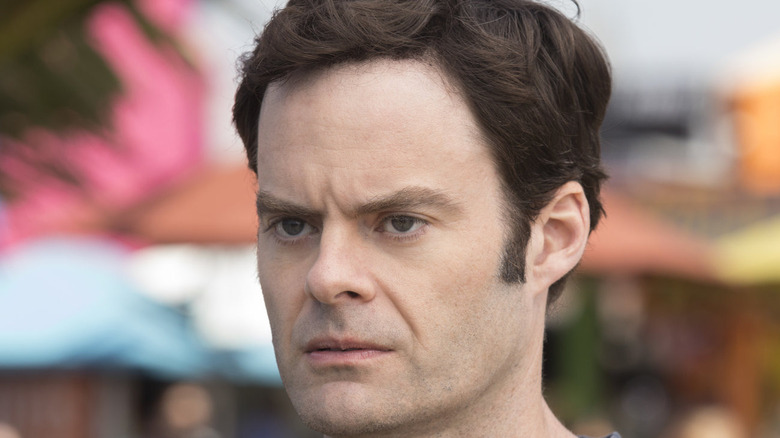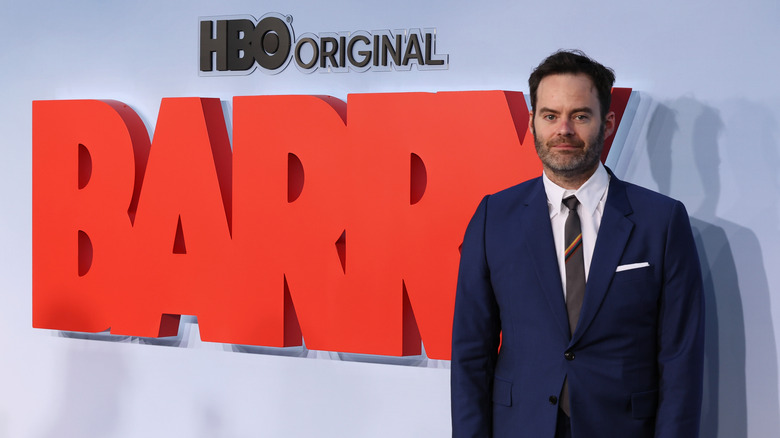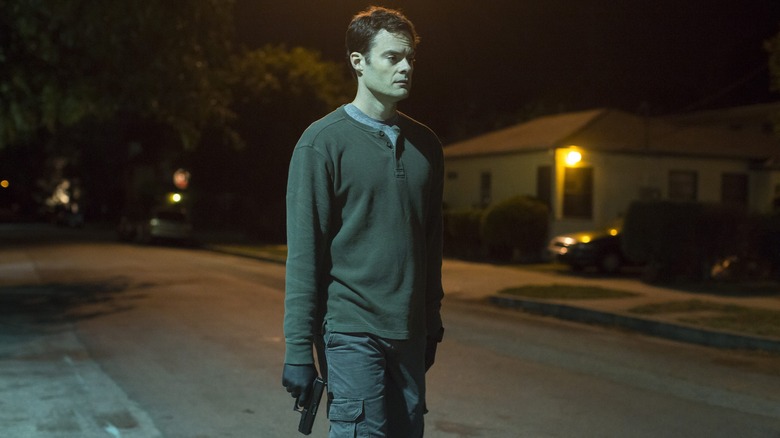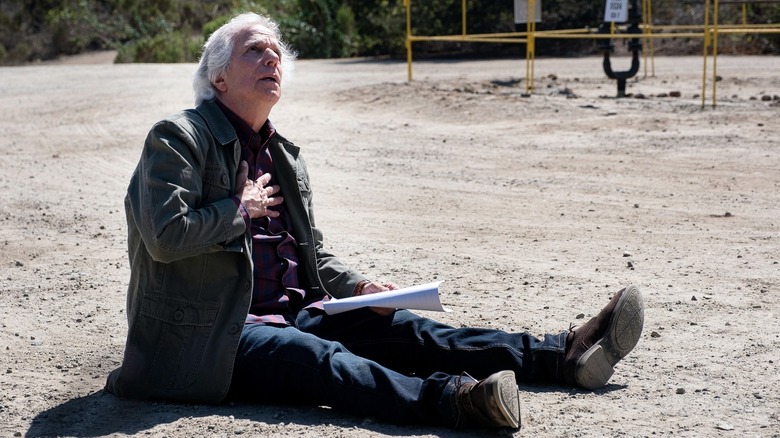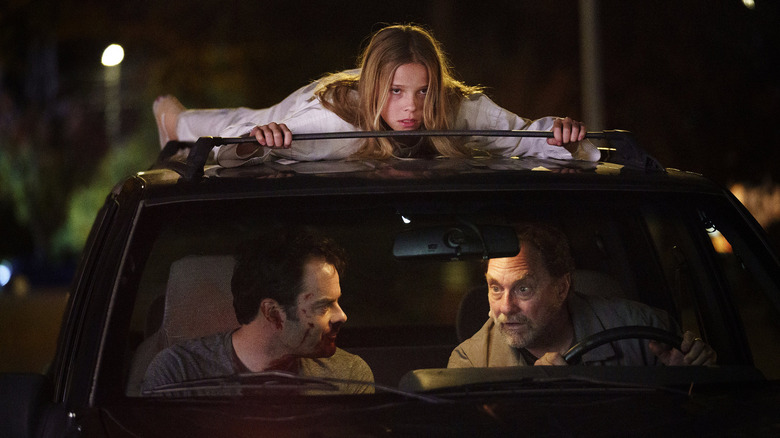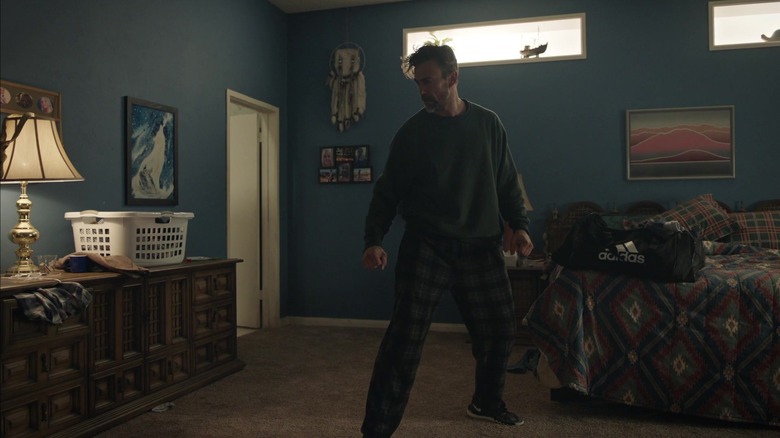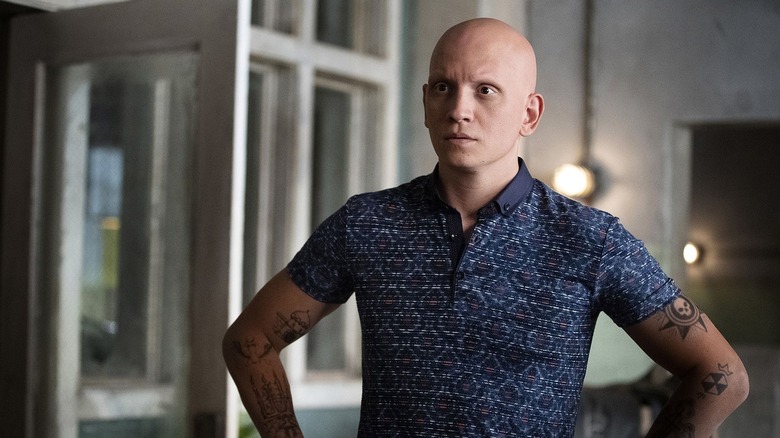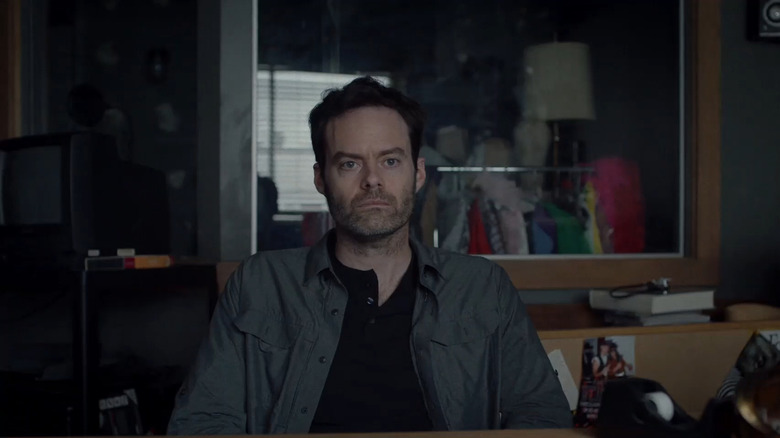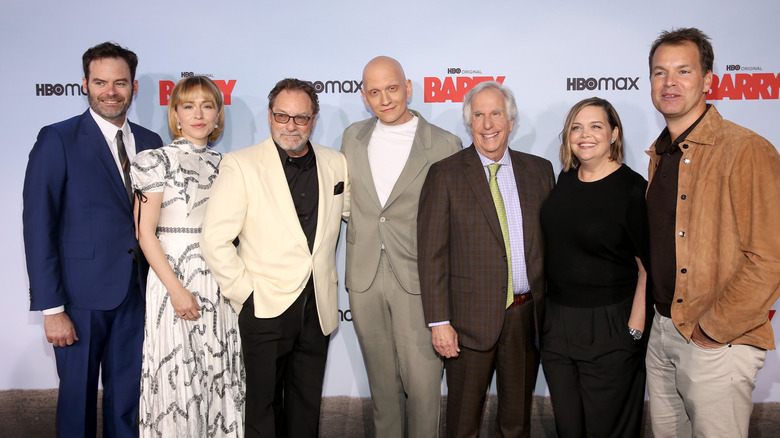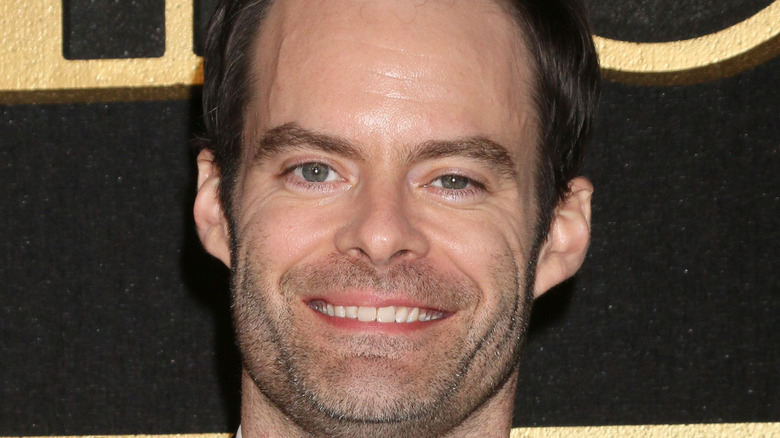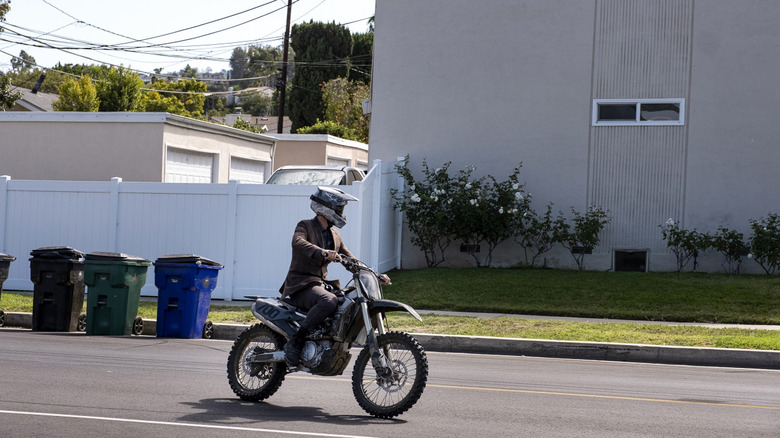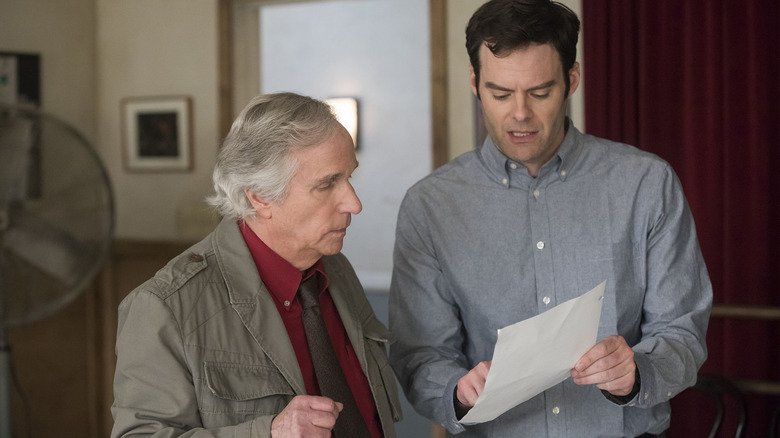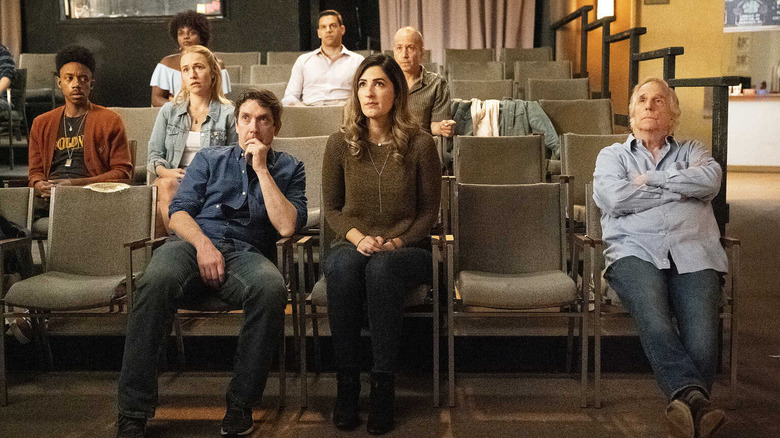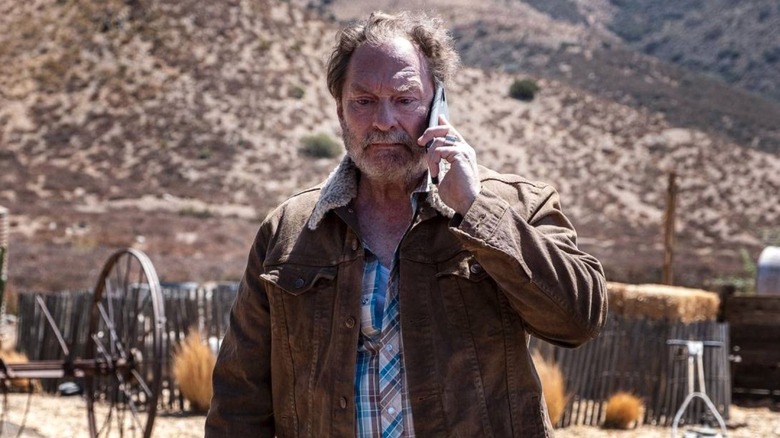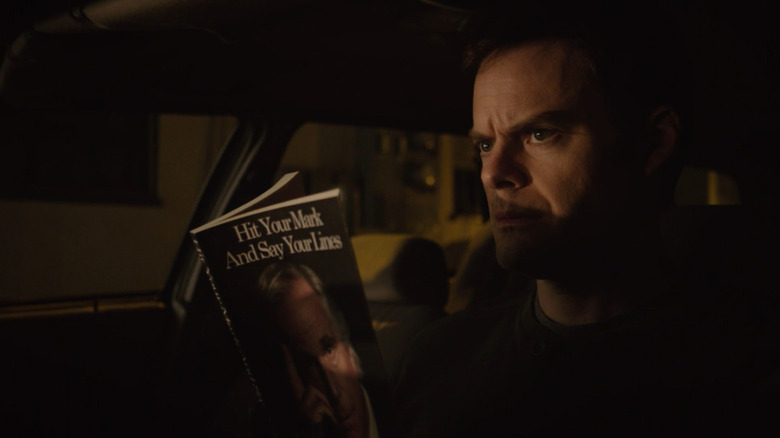The Untold Truth Of Barry
Few TV shows have come farther from left-field to surprise critics and audiences than HBO's "Barry" (2018-present). The brainchild of Alec Berg and Bill Hader, the latter is also the show's main lead, producer, writer, and director. Considering Hader's illustrious career in comedy, particularly his stint on "Saturday Night Live," fans were expecting "Barry" to be zany and goofy.
Instead, the series turned out to be a sobering look at the cost of following your dreams in the face of life-and-death morality. Hader plays the titular character of Barry Berkman/Barry Block, a former Marine who spent many years as a merciless hitman. Tired of his life of violence, Barry finds an unexpected calling when he is swept up in the world of aspiring actors in L.A. The question is, can Barry find a way to escape his criminal past and create a new, safe life for himself?
In Hader's capable hands, "Barry" manages to toe the fine line between horrific drama and pitch-black gallows humor. The show never shies away from the violence in Barry's life, but it is presented as far more ordinary and despicable than what flashy action blockbusters try to show. With multiple award nominations and wins to its credit and a newly released third season, "Barry" has many little-known facts that devoted fans should learn.
The show reflects Hader's real-life struggles
Fans were taken aback when they first saw Bill Hader in the lead role in "Barry." Nothing in the actor's previous repertoire of funny guys and master impressions on "Saturday Night Live's" broad parodies prepared audiences for Hader's role as a deeply tortured hitman who does horrific things for self-preservation.
But the roots of the character actually do find an echo in Hader's experiences on "SNL." The actor has often spoken about his struggles with anxiety that made his time on the sketch show extremely difficult to get through. Hader took those same feelings of secret anxiety and doubt from his "SNL" days and channeled them into Barry's struggles to fit in with the "aspiring L.A. actors" crowd while trying to mask his past as an assassin.
This connection between Hader's time on "SNL" and "Barry" was pointed out by the latter show's co-creator Alec Berg in an interview with THR. "[Hader is] just so unbelievably good at [comedy and acting] that [his SNL career] just willed itself into being, and he couldn't stop it," Berg explained. "We both thought the idea of somebody who was incredibly naturally gifted at something that they didn't love doing was an interesting internal struggle."
Hader put on muscle
While "Barry" arguably features some of the best action scenes ever seen in film or on television, Bill Hader is an unlikely candidate for the role of the action hero. Apart from his reputation for playing goofy characters, Hader's tall, lanky frame and sensitive face do not scream "hitman."
Hader tried to bring about a physical change to lend credence to the idea that he could play a former Marine and hitman—only his body was having none of it. The actor has spoken about his attempts to "bulk up" for the role of Barry Berkman. But his naturally slim build made it difficult to showcase the muscle gains in an obvious manner, especially under the nondescript clothes Barry prefers to wear in order to blend in.
"I went and I got a trainer and I worked out," Hader revealed in an interview with Conan O'Brien. Even after he'd been working out regularly for six months, his friends found it hard to believe he had been exercising at all just by looking at him. Fortunately, a lack of muscle did not stop Hader from taking on the role of Barry. He's convincing enough in the part that he won an Emmy for it.
Winkler made Gene nicer
"Barry's" supporting cast is strong and helps elevate the show to new heights. One of the most notable performances comes from the iconic Henry Winkler in the role of Gene Cousineau, Barry's acting teacher. He's the not-so-wise sage giving the budding actor advice on how to make it as a thespian.
Much like Barry, Gene is a knot of contradictions. His soft-spoken demeanor hides a self-centered temperament and lasting bitterness due to his own failed dreams of becoming a star. Winkler's natural warmth and charisma do a lot to smooth out Gene's more toxic personality traits, but the character was meant to be much more hardened before Winkler was asked to take on the role.
"When [the show creators] wrote it, my character was much darker, much colder—really cynical," Winkler explained in an interview with Deadline. "Then, they kept writing Gene to me. They said, 'Oh my god, you're bringing such warmth to the character. We did not see that existed.'" According to Winkler, his take on Gene was inspired by the different acting teachers he has worked with over the years, and real-life actors have often told him they knew someone just like Gene Cousineau in their own acting school.
Lily's part was specially written in
It can be difficult to put "Barry" in any specific genre box because of how many unexpected influences Bill Hader draws from while writing and directing the show. Many episodes are specifically inspired by or pay homage to the style of famous filmmakers. Hader is not afraid to throw curveballs at the audience with the occasional over-the-top sequence.
One of the best sequences of that nature takes place in Season 2, Episode 5, "Ronny/Lily." Barry is reluctantly hired to eliminate a man named Ronny, who has been sleeping with the wife of a dirty cop. When Barry arrives at Ronny's house, he is unexpectedly challenged by a diminutive martial arts expert named Lily. Despite her youth, Lily proves a serious challenge for Barry as she fights and moves with the ferocity of a wild animal.
The role of Lily was played by Jessie Giacomazzi, who was referred to Hader as a child stunt person in case he wanted to do an action scene involving children. According to an interview with Deadline, Hader was so impressed by Giacomazzi's physical abilities that he wrote the part of Lily just for her. Despite having little acting experience, Giacomazzi turned out to be one of the most memorable parts of "Barry."
Ronny was supposed to be very different
The "Ronny/Lily" episode in Season 2 is often cited as one of the best in the entire run of "Barry," and with good reason. Despite its depressingly sordid premise, where Barry has to kill a guy named Ronny because he is sleeping with the wife of a dirty cop who can expose Barry's past, the episode is a perfect example of the kind of dark comedy-action that "Barry" has perfected like nothing else on television.
After arriving at Ronny's home looking to end the matter quickly, Barry is caught off guard upon discovering that Ronny is a massive individual with a host of awards from martial arts competitions. For once, it seems Barry's mission will fail because Ronny looks so threatening. Ronny is played by actor and real-life martial artist Daniel Bernhardt, but the initial plan was for Ronny to be the exact opposite.
"In the script, Ronny was a short, fat, bald guy," Bill Hader explained to The New York Times. "He was this schlub, and it was this weird reveal that he was a taekwondo master." According to Hader, it was proving extremely difficult to find a schlubby guy who was also a skilled martial artist in real life, since the sport requires a great deal of discipline and exercise. Bernhardt got the part despite looking nothing like Ronny on paper.
Long live NoHo Hank
While most of the main cast of "Barry" has already proven their drama and comedy chops in past roles, one genuine revelation was Anthony Carrigan in the role of NoHo Hank, the cheerful Chechen mobster who plans to rise through the L.A. underworld with the help of Barry's murderous skills.
Some audiences knew Carrigan before his time on "Barry," when he played a very different kind of mobster. The actor gained a following for his role as the psychotic serial killer and noted "Batman" villain Victor Zsasz on the "Gotham" television series. Few who remembered Carrigan's chilling take on Zsasz could have believed he'd be able to pull off a light-hearted and goofy character like NoHo Hank.
Not only did Carrigan nail Hank's characterization, but he also went so far above and beyond that the actor changed the fate of his character. "Initially, in the pilot, [Hank] died," Bill Hader revealed to Uproxx. "And then [showrunner Alec Berg] and I said, 'We'd be insane to kill that guy. He's so funny.'" So Hank's initial death scene was turned into one where he suffered a nasty injury instead. The character went on to become one of the best aspects of the show.
The show has no overarching plan
Despite featuring some of the best writing among modern television shows, "Barry" does not seem to follow an overarching narrative. Sure, the titular character wants to turn his back on crime and become a legitimate actor, but the path he takes towards that goal is anything but straight.
Instead, the series does a good job of toggling between Barry's life as a reluctant hitman and his life as an aspiring actor. Occasionally, the two parts of his life collide with destructive results, but things return to the status quo at the end of most episodes. This makes "Barry" more episodic in nature than something like, say, "Breaking Bad," which followed a definite path charting chemistry teacher Walter White's transformation into the criminal Heisenberg.
This seemingly structure-less approach to crafting new episodes for a season is how the creators of "Barry" have played it from the start. "We talked a little bit about where we might be heading [in the Season 1 finale] as we were writing [each episode]," series co-creator Alec Berg told THR. "But really you sort of back out and you have big-picture conversations and then you just start at the beginning and play the cards as they're dealt."
Hader hates firing actors
Already acknowledged to be one of the funniest men of his generation in Hollywood, Hader proved through "Barry" that he could also be a serious actor, director, writer, and producer.
As cool as it sounds to do so many things so well, it also means that Hader faces by far the most pressure while working on "Barry." The multi-talented performer seems to juggle his various duties on the show with ease. Still, nothing's perfect, and Hader has revealed one aspect of the job that he dislikes: the necessity of removing someone from the cast for any reason.
"It's the worst part of the job by far," Hader told Collider. "Having to tell or having to tell somebody, 'Hey, you were recast,' which we've had to do. Or 'Your part got cut.'" According to the actor, the fact that he has suffered such rejections in his own career as a performer makes it even more awful that he has to now do the same thing to other actors since he is the co-showrunner.
The show doesn't aim to glorify violence
There are two narrative aspects that "Barry" shares with major action films. The main character is supposed to be someone you can empathize with so you want to follow their journey. That journey involves copious amounts of violence and rage that the audience is supposed to want to watch despite its graphic and upsetting nature.
Most action movies take the easy path of providing a stylized version of the violence to the audience that makes it more palatable. The creators of "Barry" were very clear from the start that they did not want to present the violence on the show as anything other than the bad, terrible thing it is.
"We wanted the violence to be incredibly real because it should be a world that he doesn't want to be in anymore." Hader said at Variety's Tune In! TV Summit (via Yahoo News), later adding, "Maybe it's being a parent or something, but I just don't like violence being for laughs." This type of unflinching approach to depicting violence means that audiences have had an increasingly difficult time trying to root for Barry as he does one awful thing after another while trying desperately to find a way out of his criminal life.
A scene was inspired by L.A. road rage
In the first two seasons of "Barry," you could get a definite sense of the fact that the show was not the most expensive one around. Most scenes took place inside closed settings in ordinary surroundings. The action sequences were also stripped down to the bare minimum, with little in the way of fancy car chases or big explosions.
With the recent release of the third season of "Barry," the show finally seems to have gotten a big enough budget to attempt more ambitious action set pieces. The highlight of the season in this regard is a motorcycle chase sequence that Barry gets caught up in during the sixth episode. The scene plays out like a hilariously suburban version of "Mad Max: Fury Road." While Bill Hader expressed his love for that kind of movie in an interview with Yahoo!, he revealed that his main source of inspiration was a real-life experience.
"I think it came really from driving in Los Angeles and being in traffic and having those motorcycles split lanes," Hader explained. "And it freaks me out every time they do that." Taking that anxiety and dialing it up to eleven is how Hader decided to film the chase sequence, as Barry continuously gets shot at while trying to weave his way through the traffic on his busted-up motorcycle.
The show started with a unique pitch
The universal praise that "Barry" has received since Season 1 is a bit of a distraction from how bizarre the central premise of the show is: a comedy so black it borders on depressive about a hitman who wants to become an actor and put his past life behind him, but keeps screwing up in horrific ways and crossing paths with truly despicable characters.
Pitching such a show to the network was a challenge for co-creators Bill Hader and Alec Berg. The people over at HBO had seen Hader's affecting performance in 2014's "The Skeleton Twins" and offered Hader a development deal where he could pitch a show to the studio. Instead of going the predictable route with a sketch show, Hader partnered up with Berg to brainstorm ideas for a dramatic series.
For a month and a half, the duo could not settle on a single premise that they found sufficiently appealing. After an off-handed comment from Hader about playing a hitman, it occurred to them that a lot of comedy would be mined by contrasting the life of an aspiring actor with the life of a reluctant hitman. "It was like Travis Bickle [from Taxi Driver] met the people from 'Waiting for Guffman,'" was how Hader described the pitch for the show to The Baltimore Sun. "And they taught him how to be a human being again."
Bill Hader and D'Arcy Carden go way back
When "SNL" alumni move on to other projects, they tend to work with a lot of their old castmates from the show. Bill Hader himself has appeared in several projects belonging to his "SNL" castmates, from Kristen Wiig ("The Skeleton Twins") and Fred Armisen ("Documentary Now!") to Andy Samberg ("Brooklyn 99"). While "Barry" does not feature any cameos from prominent "SNL" alumni, it does have a part played by one of Hader's old acquaintances.
D'Arcy Carden is an actress best known for her role as Janet on the NBC sitcom "The Good Place." Carden also shows up in "Barry" as Natalie Greer, a fellow aspiring actor who befriends Hader's character after he joins their acting school. This was not the first time that Hader and Carden had worked together, although their previous working relationship had been completely different.
"I was his nanny," Carden explained to Seth Meyers about working for Bill Hader before she found success as an actress. "For [the family's] two oldest daughters." Describing the job as "full-time," Carden revealed that she continues to enjoy a close relationship with Hader's daughters.
Playing Fuches is a dream job for Stephen Root
Among the many excellent performances that "Barry" has going for it, few have inspired as much of a love-hate relationship as Stephen Root's career-defining performance as Barry's handler Fuches.
Root has appeared in a number of notable film and television projects during his years in Hollywood, but Fuches hits audiences in a way no other character from the actor's extensive repertoire has. The character starts as a wiser, older mentor trying to help Barry navigate his life as a hitman. But it soon becomes clear that Fuches' governing passion in life is his own well-being, and he will double-cross anyone, including Barry, in his quest to gain the upper hand.
Playing such a complicated character is a source of great joy for Root. "[The role of Fuches is] a character actor's dream," the actor told Collider, explaining later on, "It's rare to get the quality of writing, and everybody on the same comedy page and drama page, so that everybody can do both."
The book title sums up the show
Despite "Barry's" commitment to the seriousness of its subject matter and its broad comedy, "Barry" is not without its slyer jokes.
Consider the book on acting written by Gene Cousineau that the students in his acting class pore over. The title of the book is "Hit Your Mark and Say Your Line." While the statement applies to acting on camera or on stage, it also directly applies to Barry's life as a hitman where he is supposed to kill his mark and then cover up his actions by saying whatever lines he needs to escape suspicion. Barry's entire journey through the show can be summed up as him hitting his mark and then saying his lines convincingly enough to avoid getting caught. The titles of the chapters of the book also serve as Season 1 episode titles.
The show also contains elements of meta-humor, such as Hank's dialogue occasionally containing references to Hader's past "SNL" skits.
